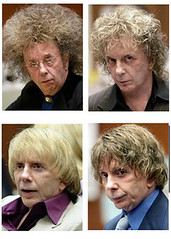Phil Spector: Judge to Change Jury Instructions

I can't understand the Judge in the Phil Spector case. Yes, if you're a prosecutor or a judge, it's a drag to try a case for five months and get a hung jury. But when the jury is deadlocked, you don't get a do-over on the charges or the instructions just to force a verdict. That's a recipe for reversal, in my opinion.
Yesterday, the Judge said he was contemplating allowing the jury to consider a lesser charge to solve the impasse. At least a good night's sleep cured him of that.
But today, while deciding against allowing the jury to consider a lesser charge, he decided to modify a critical jury instruction by striking a central statement from it. To make up for any prejudice, he said he'll allow the attorneys to present additional closing arguments.
As the LA Times characterizes it, he "threw the prosecutors a life preserver."
More...
| < Giuliani Calls Himself One of the Most Famous Persons in the World | Edwards to Return Campaign Contributions From Convicted Attorney > |



